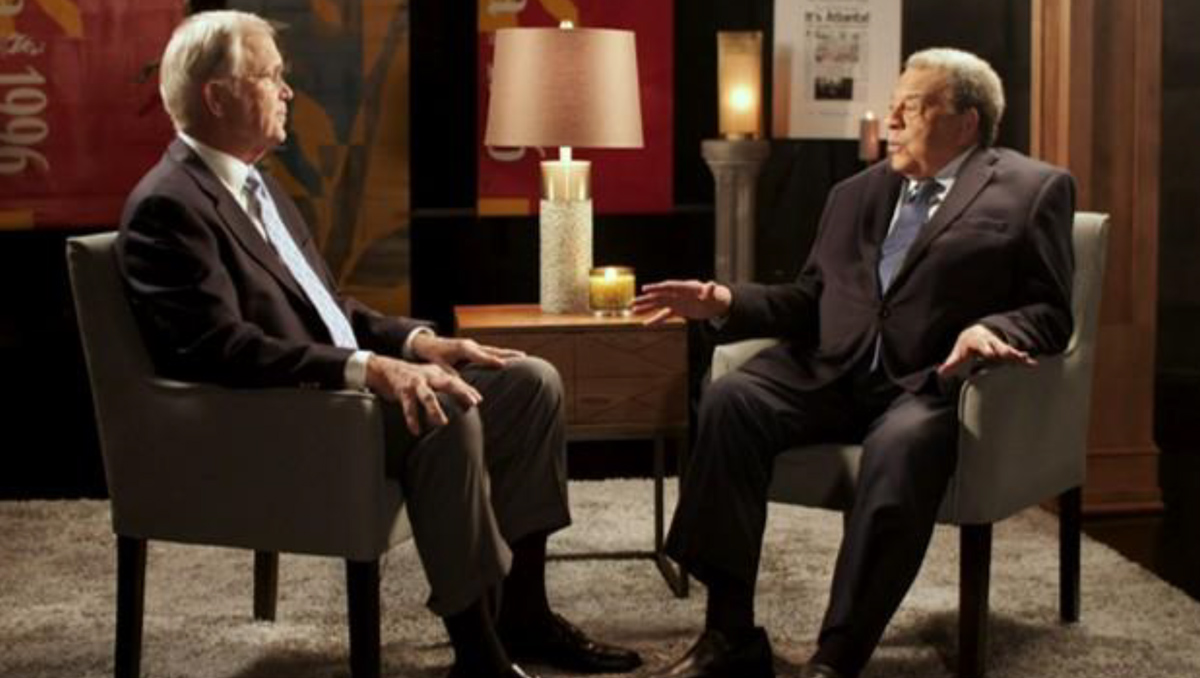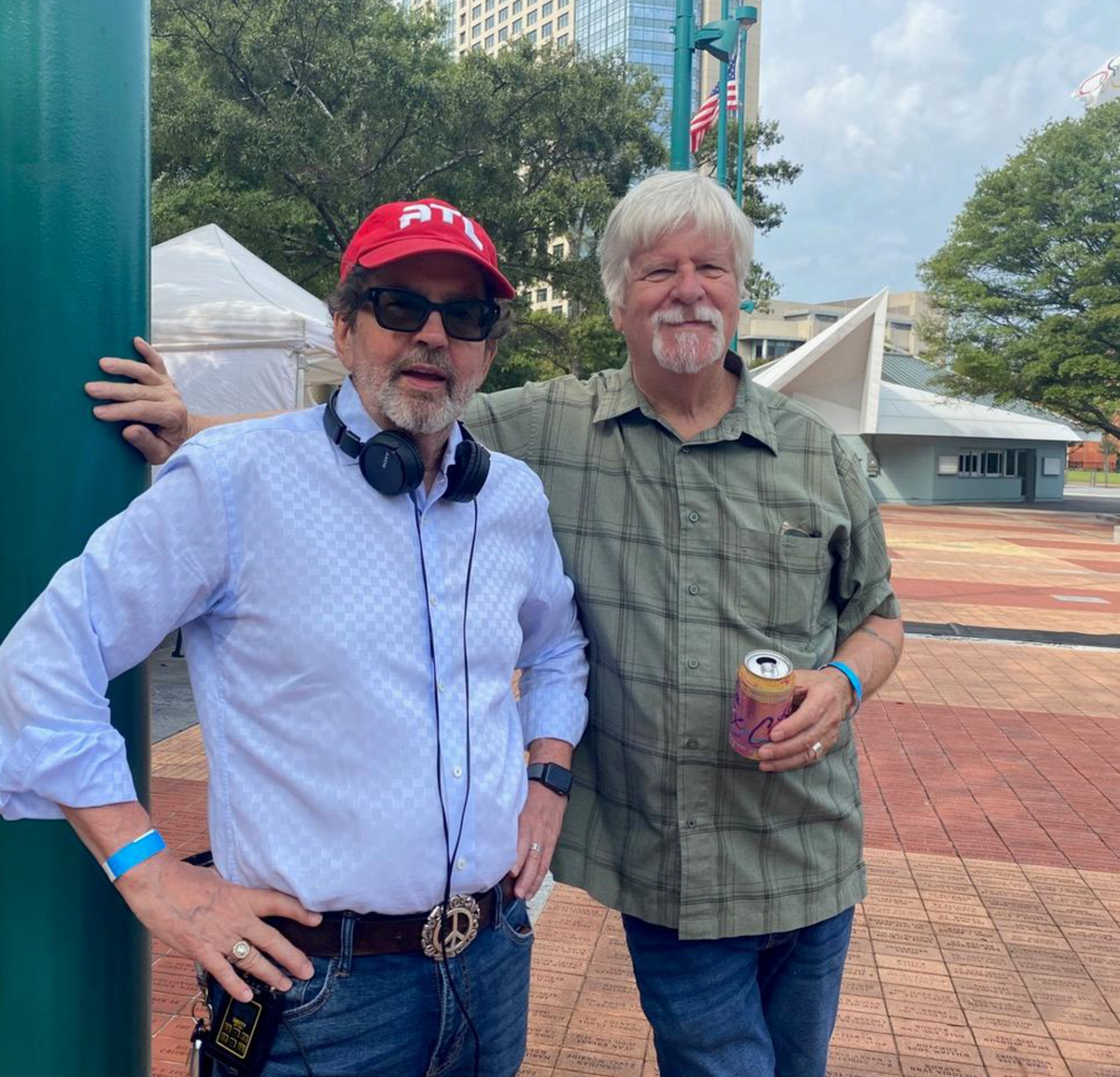
Photograph courtesy of Atlanta Story Partners
Like Atlanta’s unlikely journey to host the 1996 Centennial Olympics, for The Games in Black and White filmmakers George Hirthler and Bob Judson, the path to make the new documentary—premiering at the 49th annual Atlanta Film Festival Saturday, April 26 at the Rialto Theatre for the Arts—was equally long and complicated. The documentary tells the story of the enduring friendship between United Nations Ambassador Andrew Young and 1996 Olympic Games CEO Billy Payne that was forged in the fire of figuring out how to bring the world’s largest sporting event to the cradle of the American civil rights movement.
Judson and Hirthler, who share producer and director credits on the film written by Hirthler, (who, in 1990, also helped to write the city’s 630-page bid book for the games) self-funded the documentary’s first 17 interviews prior to the pandemic before corporate underwriting came through on the project. Early this month, they were still at work securing final photo clearances as the film’s final cut was underway.
But their efforts clearly paid off.

Photograph courtesy of Atlanta Story Partners
In addition to capturing on film the affection Young, 93, and Payne, 77, clearly have for one another, The Games in Black and White also returns to the forefront the 1996 Games’ lost humanitarian legacy: vaccinating 15 million children around the globe thanks to its partnership with UNICEF, ceasing wars around the world for 30 days while aid workers inoculated kids. Also lost in the aftermath of the July 29, 1996 Centennial Olympic Park bombing in downtown Atlanta was the groundbreaking formation of the Equal Economic Opportunity Project, initiated to give minority and women-owned businesses a place at the international Olympics table for the first time.
In an interview with Atlanta, the filmmakers discussed why now was the time to make the doc and what they hope to add to the 1996 Summer Games legacy as it nears its 30th anniversary next summer.

Photograph courtesy of Atlanta Story Partners
Why was now the right time for this documentary?
Hirthler: Given what was happening in 2019 [when they began working on the film] and the state of race relations both in the United States and around the world, it seemed here was a positive story out of the past that had incredible implications for the city.
Judson: As years go by, it was even more important for us to take a story like this—a brotherhood between races—and make a documentary about it. Plus, with this film, we were able to give due to the city that’s made both George and myself successful over the years.
We’re 15 minutes into the doc before we see these two men sitting side by side and the film opens their conversation with former Mayor Andrew Young admitting to Billy Payne that his staff in the Atlanta Mayor’s Office, including aide Shirley Franklin, didn’t even want him to take a meeting with Payne, chiefly because the 1976 Montreal Games were still $700 million in debt. Did that story catch you by surprise as you rolled film?
Hirthler: The truth is, that was in the air. Montreal was that far in debt and also the boycotts [more than 20 countries boycotted the Montreal games] were always a looming threat. When the two of them got together, that interview on camera was an immediate encapsulation of the brilliance they had 30 years earlier. We put the two chairs in place, we sat them down together and boom, just like that the magic was occurring. Bob went right home and cut that sequence. It was very easy to see not only the camaraderie between them but the love and the friendship they have for each other.
Judson: To his credit, Billy surrounded himself with astute business people. They weren’t going to let the city go through the same thing Montreal did. It was really brilliant the team he put together and then Andy Young is the global ambassador with these relationships around the world. They both made sure Atlanta would actually benefit from this.
Two pieces of the 1996 games legacy lost over time were the Atlanta Olympic Aid Project and the importance of hardwiring into the Atlanta games opportunities for minority and women-owned businesses. Why was it important to include those aspects of the story?
Judson: Given the climate of the world now, it was a nice reminder that you can use an event like this to create peace. That’s what the [International Olympic Committee] is all about. You need these kinds of large global events to spread those kinds of messages.
Hirthler: We viewed this story all along as the intersection of the civil rights movement and the Olympic movement because of Atlanta’s unique heritage and the role that Andy Young played. The movements share the same set of values. We knew, at heart, the Olympic movement is really about bringing the world together in friendship and peace through sport. We wanted to celebrate that, and we wanted to celebrate that, historically, the Olympics have been an open door to African-Americans and Black [athletes] around the world. The Olympics have always been the most progressive international sports movement and they remain that today. Andy, rightly, saw that, at the heart of that movement, there was a call for peace. That story and the story of minority and female-owned business initiatives, all of that was lost. It was probably lost because of the bombing and the media focusing on transportation and the technology problems at the beginning of the games. But Bob and I knew these were important stories that had to be brought forth. You can’t judge the Atlanta games historically [until] you know these stories. On the international front, where I’ve been working for 30 years, the Atlanta games have a diminished reputation. They’re considered problematic. Nobody ever talks about this aspect of it.
One of the things this doc does is show viewers that we, as Atlantans, have a much different perception than the world does. As we inch further away from the summer of 1996, it does feels like the bombing changed the trajectory of how history regards these games, doesn’t it?
Hirthler: Because of that, we lost the ability to tell the story of Andy and Billy, which has never been fully told and also the message Atlanta intended for the world was never fully heard. But almost 30 years later, Bob and I realized we had an opportunity to set the record straight. An opportunity to give Atlanta a point of pride in its own Olympic history to rally around. We wanted to give Atlanta a new chapter in the history of these games.
George, which was more difficult—writing the 630-page bid book for the 1996 Olympics or getting the sports rights clearances for this doc?
Hirthler: Definitely the rights clearances! We had to clear over 600 images. We had a call with lawyers yesterday and finally worked through the clearances of the last few images. The International Olympics Committee and the US Olympics Committee were generous with the rates they gave us in order to do the film.
Judson: We had to pick montage segments apart and do forensic investigations to find out who owned certain images or whether they were public domain. It was a grueling experience.
This film will debut at the Rialto Theatre, a few hundred yards from Centennial Olympic Park. What do you want the audience members who may not have even been born in 1996 to take away from this new doc as the legacy of the Atlanta games?
Judson: Pride in their city and pride in the individuals that made an event like this happen against all odds. Whether they were born and raised here or recent transplants, I hope that’s what they go away feeling.
Hirthler: This is a story that should never be forgotten. Using Winston Churchill’s phrase, this was Atlanta’s finest hour. When we started bidding for the games, the only way you could tell people in Europe where Atlanta was [located] was to draw a map of Florida and show them where Disney World was. Today, you can’t go anywhere in the world where people don’t know where Atlanta is. And the games were largely responsible for that.
The Games in Black and White: Billy Payne, Andy Young and the Quest that Changed Atlanta Forever will premiere Saturday, April 26 at 6:30 p.m. during the Atlanta Film Festival at the Rialto Theatre for the Arts. For more information or to buy passes to the film, go to the AFF website.
Advertisement




